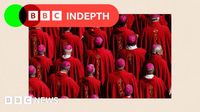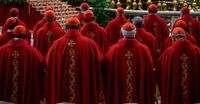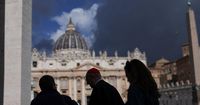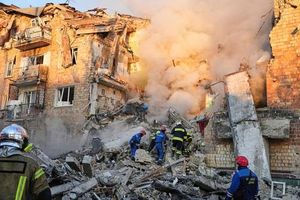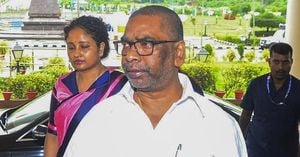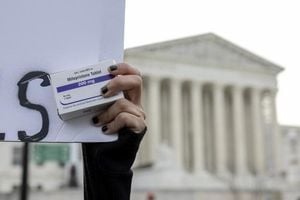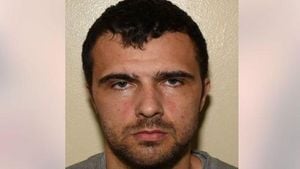VATICAN CITY — The Vatican is poised for a pivotal moment as the papal conclave to elect the next pope begins on May 7, 2025. With more than 130 cardinals arriving in Vatican City, the atmosphere is charged with anticipation and solemnity following the death of Pope Francis on April 21, 2025, at the age of 88 due to a stroke and heart failure.
The conclave, a secretive process steeped in tradition, will see the cardinals gather in the Sistine Chapel under Michelangelo’s renowned frescoes to cast their votes for the next leader of the Roman Catholic Church. Known for its intense secrecy, the conclave derives its name from the Latin term "cum clave," meaning "with a key," reflecting the locked doors that keep the cardinals isolated from the outside world during the voting process.
As the first ballot is set to be cast on the evening of May 7, the cardinals will follow a meticulously planned schedule. The day will begin with a Mass at 4 a.m. ET (10 a.m. Vatican time) in St. Peter’s Basilica, followed by a gathering in the Pauline Chapel at 10:30 a.m. ET (4:30 p.m. Vatican time) to pray and prepare for the voting.
In total, 133 cardinal electors will participate in this conclave, with two notable absentees: Archbishops Antonio Cañizares and Vinko Puljić, both 79, who will miss the proceedings due to health concerns. The conclave will commence with the cardinals taking an oath of secrecy before entering the Sistine Chapel, where they will cast their votes by secret ballot.
As the cardinals prepare to elect the 267th pope, the legacy of Pope Francis looms large. Having appointed approximately 80% of the current voting cardinals, his influence on the direction of the Church is undeniable. Francis was known for his progressive ideals, focusing on issues such as poverty, climate change, and inclusivity within the Church. The question remains whether his successor will continue this trajectory or steer the Church back towards more conservative traditions.
In the days leading up to the conclave, cardinals engaged in pre-conclave meetings, known as general congregations, where they discussed the qualities needed in the next pope. These gatherings were open to all 252 cardinals, providing a platform for sharing perspectives on the Church's future. Cardinal Michael Czerny remarked, "We’re looking for the successor of Peter. We’re not looking for a successor of Francis," highlighting the desire for continuity while acknowledging the need for evolution.
The conclave is set against a backdrop of global challenges, including geopolitical tensions and the ongoing fallout from the Church's sex abuse scandal. The new pope will face pressing issues such as the Church’s budget deficit and the need for reforms to address these longstanding problems. Cardinal Luis José Rueda Aparicio emphasized the importance of prayer, stating, "We are in need of prayer — much prayer — from all the people of God."
As the cardinals prepare to cast their votes, speculation abounds regarding potential candidates. Cardinal Pietro Parolin, the Vatican’s secretary of state, is seen as a front-runner, representing a sense of continuity with Francis’ teachings. Known for his diplomatic skills, Parolin has been involved in significant Church matters, including controversial negotiations with China regarding bishop appointments.
Another notable contender is Cardinal Luis Antonio Tagle from the Philippines, often referred to as the “Asian Francis” for his progressive views and focus on social justice. His candidacy reflects the growing influence of the Church in Asia and its diverse needs. However, some traditionalists advocate for a return to conservative values, positioning candidates like Cardinal Peter Erdo of Hungary as potential leaders who may align more closely with the Church's historical teachings.
The conclave is characterized by its unique voting process, requiring a two-thirds majority to elect a new pope. The cardinals will cast their votes multiple times each day, with the results communicated through the iconic smoke signals from the Vatican. Black smoke indicates no decision has been reached, while white smoke signifies the election of a new pope, accompanied by the jubilant proclamation of "Habemus Papam!" (We have a pope!).
The conclave’s proceedings will be closely watched, not only by the faithful but also by a global audience. The Vatican has taken extensive measures to ensure the confidentiality of the voting process, employing security measures to prevent eavesdropping and unauthorized communication.
As the cardinals gather for this historic moment, the world waits to see who will emerge as the next leader of the Catholic Church, tasked with navigating the complexities of modern faith and society. The outcome of this conclave will undoubtedly shape the future of the Church and its role in addressing the myriad challenges facing believers worldwide.
In the end, while the process is deeply rooted in tradition, the decision will hinge on the cardinals' collective discernment, guided by their faith and the pressing needs of the global Catholic community. The world will hold its breath as the cardinals step into the Sistine Chapel, ready to cast their votes and usher in a new era for the Catholic Church.
